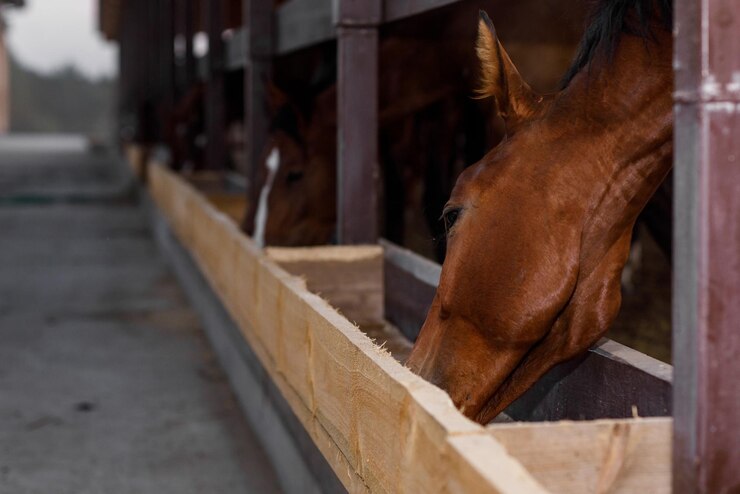The journey to understanding horse nutrition is essential for every equestrian enthusiast aiming to ensure the well-being and performance of their equine companions. A comprehensive nutritional plan not only supports a horse’s health but also enhances its performance and longevity. In the initial stages of learning about horse nutrition, one quickly realizes the complexity and importance of balancing different nutrients to cater to specific needs.
With understanding horse nutrition, equestrians embark on a path to optimize their horse’s health. The goal is to provide a well-balanced diet that meets all the dietary requirements, thus maintaining the equine’s optimal health. From selecting the right type of feed to incorporating necessary supplements, each step plays a crucial role in the overall nutritional approach.

1. The Basics of Horse Digestive System
The digestive system of horses is unique and complex. As non-ruminant herbivores, they rely heavily on a fibrous diet. Understanding the functions of each part of the digestive system, from the mouth to the hindgut, is essential for providing a balanced diet.
1.1 Mouth and Esophagus
Horses begin digestion in their mouth, where they use their strong teeth to grind food. The esophagus moves the chewed food to the stomach.
1.2 Stomach and Small Intestine
The stomach is relatively small compared to the horse’s size. Therefore, it requires frequent, small meals. Most digestion and nutrient absorption occur in the small intestine.
2. Nutritional Elements Essential for Horses
A well-rounded diet is necessary for maintaining a horse’s health. Here are some elements to consider:
2.1 Carbohydrates
The primary source of energy for horses, carbohydrates are found in hay and grains. Balancing the types of carbohydrates is vital to avoid digestive issues.
2.2 Proteins
Proteins are crucial for muscle development and repair. Quality protein sources include legumes and specially formulated feeds.
3. Tackling Vitamin and Mineral Needs
Horses need an array of vitamins and minerals to support various bodily functions. Tailoring these requirements based on a horses workload and age is crucial.
3.1 Importance of Testing
Testing for vitamin and mineral levels ensures that dietary needs are met properly, preventing deficiencies.
3.2 Supplementing Wisely
It’s important to supplement with care, considering factors like age and activity levels, to balance nutrients correctly.
4. Hay: The Dietary Staple
Hay is a critical component of a horse’s diet. Its quality can significantly affect nutritional intake. Review tips for selecting the best hay here.
4.1 First and Second Cut Hay
Choosing between first and second-cut hay can impact a horse’s nutrition. Generally, a second cut proves more nutrient-rich.
5. Managing Feeding Schedules
Providing meals on a consistent schedule aids in digestibility and nutrient absorption, reducing stress on the digestive system. Gain insights into structuring an effective feeding schedule.
5.1 Frequency and Portion Control
Frequent, small meals are preferable as they align with a horse’s natural eating habits.
5.2 Feeding Performance Horses
Performance horses have different nutritional demands. Explore the tailored diets for these athletes.
6. Understanding Water’s Role
Water is the most critical yet often neglected aspect of horse nutrition. Adequate intake is crucial for digestion and overall health.
6.1 Ensuring Fresh Water Supply
Ensuring constant access to fresh water helps maintain hydration and optimal bodily functions.
7. Identifying Nutritional Problems
It’s not uncommon for horses to develop nutritional problems. Early diagnosis and addressing deficiencies are vital. Learn more about spotting issues.
7.1 Monitoring Weight and Condition
Regularly monitor weight and body condition to adjust feeding practices as needed.
7.2 Signs of Deficiencies
Watch for signs like lackluster coats or poor performance, indicating possible deficiencies.

Faqs
What are the primary nutrients a horse needs?
Horses primarily need carbohydrates, proteins, fats, vitamins, minerals, and water in their diets.
How can I ensure my horse is getting enough vitamins?
Regular testing and consultation with a veterinary nutritionist can help tailor the best diet for adequate vitamin intake.
How often should a horse be fed?
Horses benefit from multiple small meals throughout the day rather than one or two large feedings.
This article contains affiliate links. We may earn a commission at no extra cost to you.
